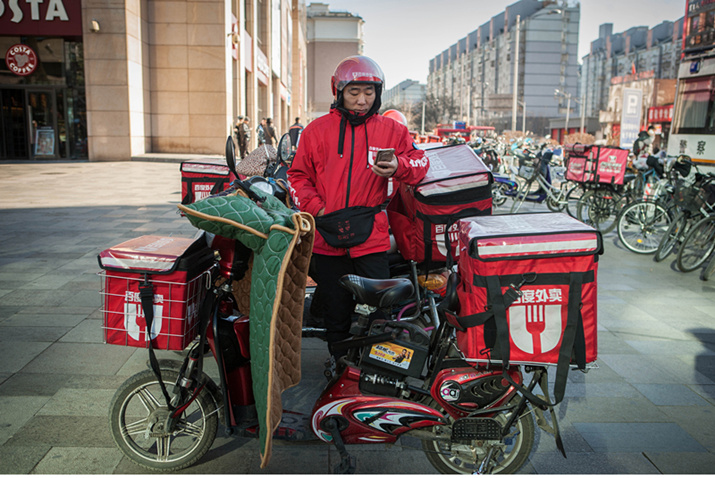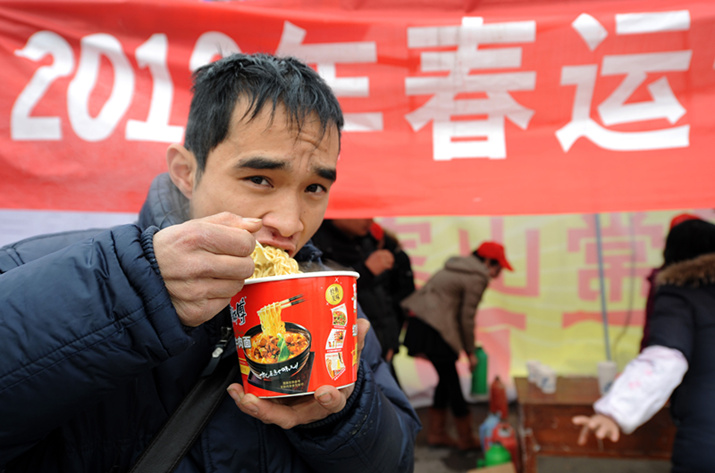|
||||||||||
| Home Nation World Business Opinion Lifestyle ChinAfrica Multimedia Columnists Documents Special Reports |
|
||||||||||
| Home Nation World Business Opinion Lifestyle ChinAfrica Multimedia Columnists Documents Special Reports |
| China |
| Changing Tastes |
| Instant noodles lose favor as the online meal-ordering industry captures offers more nutritious options |
| By Zheng Yang | VOL. 8 November 2016 ·2016-10-27 |

The second drawer under Qi Lian's office desk was used to hide her stash of instant noodles. Whenever she worked nightshift she would take one pack, fill it with hot water and in three minutes her dinner was ready. The best part is that is only cost four yuan ($0.6)
But the drawer has rarely been opened since the 26-year-old Beijing resident was introduced to a meal-ordering app by a friend. Placing an order on her smart phone only took a minute. Thirty minutes later a delivery man would knock on her door with the order - a substantial and nutritious hot meal of rice, meat and vegetables, all for around 20 yuan ($3)
"It's more expensive than the noodles but still affordable, and I think it's worthwhile," said Qi. "At least I can feel that I'm eating [a more] healthy [meal]."
Qi is just one of 150 million Chinese consumers who have made the move to online meal-ordering apps, according to the China Internet Network Information Center (CNNIC). The shift is providing the sternest challenge to date for the instant noodle industry, which has seen its profits tumble.
Sunset industry
September 5 was a black day for Tingyi, China's biggest instant noodle maker. The company was officially removed from Hong Kong's Hang Seng Index (HSI) constituent stocks after seeing its profits plummet 60 percent in the first half year of 2016.
Tingyi joined Hong Kong's HSI in 2011 at the apex of a ten-year prosperity cycle, during which its share price increased more than 20-fold. This success came on the back of the golden age of instant noodles in China.
Invented by Japanese businessman Momofuku Ando in the late1950s, instant noodles quickly swept across Asia with the advent of convenience foods. But it was only after conquering the massive Chinese market that it really took off. Its advantages are easy to understand - convenient, cheap and accessible - a perfect match for the needs of low income people, those trapped in the rat race and starved of time to cook a real dinner, or train travelers on long journeys needing sustenance.
By the time Tingyi joined Hong Kong's HSI, China had become the world's top consumer of instant noodles and was also producing more than half of the world's instant noodles, according to Xinhua.
As the pioneer in the market, Tingyi had the biggest slice of a very big pie -Tingyi's factory in Tianjin produced nearly 5 billion packages of instant noodles annually, more than the total combined output of all instant noodle factories in Japan, generating $4 billion, according to the company's financial report in 2012.
But in the same year of 2012, China's instant noodle sales began to drop. A report released earlier this year by the Chinese Institute of Food Science and Technology confirmed what few people would believe -the sales volume of instant noodles in China has been declining for five consecutive years and six manufacturers have already left the market. In August, Tingyi received its worst six-month financial report in the past 10 years, while its competitors, such as Ting Hsin, were also struggling with a drop in sales.
Zhu Danpeng, Research at the China Brand Research Institute, attributed the industry's precarious situation to the change in market environment, most notably the demand for convenience food on the trains decreased with the development of high speed railways; the population of low income migrant workers shrunk with China's urbanization; and most importantly, online meal-ordering services provided consumers with more options than they had previously.
Healthier options
While doom and gloom marked September 5 for Tingyi, for Zhang Jun it was just another working day. From 11 a.m. to 2 p.m., the 31-year-old delivery rider rushed through the streets of Beijing on his motorbike. The app on his phone would tell him which restaurant to pick up food orders and at which address to drop off. He had a 40 minute deadline.
Being a delivery rider was not for the faint-hearted. "You have to be very fast. Time is money," said Zhang, who could deliver 20 meals a day. "Some people can do more within the same time, and of course, they can make more money."
For every order completed, the delivery rider earns between two to six yuan($0.3-0.9), which, together with a basic salary, could total more than 5,000 yuan ($742) a month, a decent income in Beijing for people without a degree or professional skills.

This job hardly existed five years ago, but today, platoons of delivery riders whizzing along the streets have become characteristic of Chinese cities.
What connected the riders with restaurants are the meal-ordering platforms accessed by 150 million Chinese consumers through their smart phones.
One of the four major platforms, Ele.me, for example, was founded in 2009. In less than seven years, the company has expanded its business to over 1,000 Chinese cities and had over 500,000 restaurants registered. It is now leading the market with a daily trading volume of 200 million yuan ($30 million), according to a report released by the company in August.
The new trend also benefited the restaurants. South Memory, a popular Chinese restaurant chain indicated it could receive 4,000 online orders per day.
Until 2015, the online meal-ordering market in China was worth about 44 billion yuan ($6.2 billion), almost the same size as the noodle market at its peak. It is estimated to continue growing to 150 billion yuan ($22 billion) in 2018, according to CNNIC.
Online meal-ordering is just another e-commerce miracle, but Wu Xiaobo, a financial commentator, believed that it was not achieved by the power of the Internet alone. In the past years, the food and beverage market was also reshaped by people's increasing awareness about healthier eating, he said.
In a recent survey by the research company Nielsen, three-quarters of the interviewees said they were willing to pay a higher price for healthy food without artificial flavoring and non-genetically modified food.
Against such a background, instant noodles, was not the only food stuff losing favor. According to a report by survey firm CTR Market Research, the sales of beer, sweet beverages and packaged food such as ice cream and candy also slumped in 2015. Meanwhile, more nutritious foods like yogurt and certain energy beverages were increasingly in market share as people became conscious of a healthier lifestyle.
This taste change is "irreversible" as the Chinese economy keeps growing and the middle-class population increases, said Wu.
"People didn't pay much attention to healthier eating in the past, because it took much more time and money. But now we have a variety of online services to make it easy and affordable," said Qi, "So why not?"
| About Us | Contact Us | Advertise with Us | Subscribe |
| Copyright Beijing Review All rights reserved 京ICP备08005356号-5 京公网安备110102005860号 |